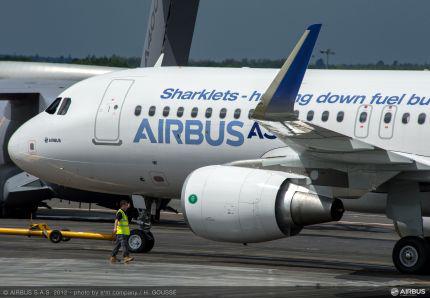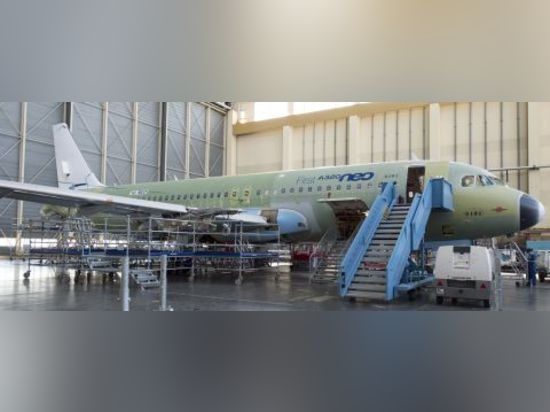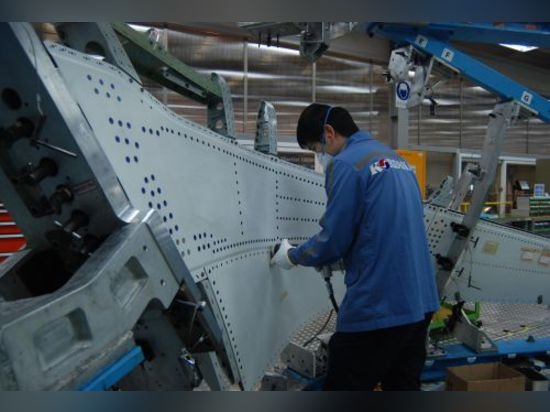
#Transports: Automotive/ Aerospace
First A320neo in final assembly features composite Sharklets made in Korea
The first Airbus A320neo is in final assembly in Toulouse, France, and on track for its maiden flight later this year and initial customer delivery in 2015
With more than 2,600 orders from 50 customers received since its 2010 launch, this “new engine option” A320 — note the A320 Family includes the A318, A319, A320 and A321 models — has captured roughly 60 per cent of the single-aisle commercial airliner market.
Final assembly of A320neo #1 began last month with the joining of its forward and aft fuselage sections, which were produced at Airbus facilities in St. Nazaire, France and Hamburg, Germany respectively. Next, major structures produced across Europe were attached, including the wings (Broughton, UK); vertical tailplane (Stade, Germany); horizontal tailplane (Getafe, Spain); engine pylons (St. Eloi, France); and outer and inner wing flaps (Bremen, Germany). The main flight-test instrumentation equipment has also been installed.
This first A320neo will be powered by PW1100G-JM engines from Pratt & Whitney (East Hartford, Conn., USA) to be delivered to Airbus in the coming months. This latest generation of high-efficiency engines is only one of the innovations that enable the A320neo to deliver 15 per cent fuel savings and a CO2 reduction of 3,600 metric tonnes per aircraft per year. Large composite wingtip devices called Sharklets are also a key performance enhancer. Offered as an option on existing A320 Family models since the end of 2012, Sharklets will be a standard feature on the A320neo.
Sharklet development and high-rate production in Korea
As part of its development of Sharklet wingtip devices for its A320 family, Airbus announced an international bidding process for the project in Nov. 2009. Competing with over 20 companies from around the world, Korean Air Aerospace Division (KAL-ASD, Busan, South Korea) was selected by Airbus in May 2010 as the sole supplier for the Airbus-designed wingtip devices. It then completed manufacturing development, testing and certification.
The A320 Sharklets are 2.4 m (7.9 ft) tall L-shaped structures made from carbon fiber composites that help reduce spiral-shaped vortices formed at the aircraft’s wingtips during flight. This cuts aerodynamic drag, enabling aircraft to burn up to 4 percent less fuel, and adds 100 nautical miles of range or payload increase of 500 kg (1102 lb) while reducing carbon dioxide emission.
Nikkiso Vietnam, a 100 percent Japanese-owned manufacturing company located in Hanoi, will produce composite vertical stiffeners and plates for Korea Air, which has established an “Auto Moving Line” for Sharklet production at its 1280 m2 (13,780 ft2) plant in Busan. (Vietnam Airlines will be the first Asian airline to operate an A350, receiving the first of 14 in mid-2015). Korean Air will assemble the sharklets and deliver them to the A320 Family final assembly lines in Toulouse, Hamburg, Germany and Tianjin, China. This automated assembly operation is credited with helping Korean Air celebrate its 1,000th Sharklet delivery to Airbus in February, just 22 months after starting production in April 2012. The company claims it has produced an average of four Sharklets per day and 80 per month, though it touts the automated line can actually turn out over 100 per month. Korean Air forecasts reaching $400 million in Sharklet sales by 2017.
Founded as Korean Air Line (KAL, Seoul, South Korea), the company changed its name to Korean Air in 1984 and expanded its business in 1986 to include the manufacturing of civil aircraft components for the world’s top aircraft manufacturers. Its aerospace business division employs 2,700 people in four factories and produces the A350 cargo door, the B737 MAX winglets as well as licensed versions of the MD 500 and UH-60 Black Hawk helicopters and F-5E/F Tiger II fighter jet aircraft.


